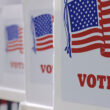There is an alchemy to the way information finds its way into the discourse, it’s unpredictable and difficult to steer. But during these last several weeks, we’ve seen how a small and independent voice can have an outsized impact.
Jonathan Winer last wrote for the Spectator on both the unlikely rise and exaggerated demise of the Independent State Legislature (ISL) doctrine, only the latest of many anti-democratic schemes hatched on the far right to counter the intent of the Constitution and to execute an end run around the primacy of the popular vote and machinery of elections.
Jonathan returned to our pages this week with “Countering the Threat of a Contingent Election,” his new analysis of the arcane process prescribed by the 12th Amendment, in which the election of the president is played out in the House.
A number of once improbable things would have to happen to get to that hazardous moment. For one, a presidential candidate would have to object to the outcome of the election, no matter the size of his defeat. Imagine that. Members of his party would have to contest the outcomes of several congressional races at the state level, purposefully throwing the partisan composition of the new incoming Congress into doubt. State legislative allies of the defeated candidate would have to ignore the popular vote and submit slates of electors committed to their defeated candidate. Renegade or faithless electors could switch their allegiance from the winner of the election to support the loser.
The rogue party of the losing candidate would have to declare their majority in the new House and vote to elect a Speaker of their choosing. The Court would have to decline to review these developments on the grounds that they traditionally keep clear of procedural matters relating to elections (a practice they conveniently suspended in Bush v. Gore in 2000).
The newly elected (or re-elected) Speaker would have to declare that the winner of the election did not win the election, thus invoking the 12th Amendment and its provisions for a contingent election. Each state congressional delegation is controlled by whichever party has the majority of congressional districts in that state, and each state gets one vote. And according to the current math of the state delegations in Congress, the contingent election would be won by the defeated candidate.
None of this could ever happen here, right? Actually, most of these events have already transpired. And if you are deluded into thinking that the remaining hurdles will save us, let me remind you that the new Speaker is an avid election denier who in 2022 led a sizeable though ultimately unsuccessful revolt in the House against a package of bi-partisan reforms aimed at curbing exactly these scenarios.
Winer’s prescription for the survival of democracy is old-fashioned: the best check on rogue actors is a robust turn-out in November for Democrats who will fend off bad faith efforts to exploit weaknesses in our election laws. In this politically charged and contested environment, the only election victories that are safe from the subversions of authoritarian and anti-democratic forces are those that are won by large margins.
Before 2020, before Trump attempted to overturn the popular vote and before he orchestrated a failed insurrection, few people ever paid attention to the byzantine mix of state and federal statutes and constitutional standards that govern what happens in a presidential contest after Election Day. We placed our trust in the democratic process and we expected the combatants and their supporters to act in good faith — even when, as in 2000 (there’s that Bush v. Gore precedent again), partisan interests including the Court clearly interfered with the fair adjudication of the election results.
As we learned from “Dancing in the Dark,” the landmark piece by Mark Medish and Joel McCleary published in the Spectator in January, there are several milestones along the way that are both critical to an orderly and democratic election result, and vulnerable to the designs of bad faith actors.
“Dancing in the Dark” caught the attention of Newsweek’s editor-at-large Tom Rogers, who devoted his column to a summary of the Medish and McCleary findings. In turn Rogers was invited on to the MSNBC program “Morning Joe” to explain the different ways in which the election process can be undermined, and he graciously credited The Washington Spector article for its original reporting.
Robert Reich, the former Labor Secretary and a commentator whose indispensable and ubiquitous defense of progressivism is reflected everywhere from MoveOn’s messaging to Substack and Alternet, devoted his entire Substack column to “Dancing in the Dark.” Thom Hartmann, another invaluable multi-platform progressive voice, wrote eloquently about the alarm bells raised by Medish and McCleary and pointed his readers to the Spectator article. A week later, on February 23, Joy Reid led off her evening show on MSNBC with detailed coverage of the article, including on-air acknowledgment of the Spectator and replication of the text of the article.
Trump has indisputably contributed many of the bleakest moments in our political history, including a reflection of the darkest side of ourselves. But he has also, perversely, triggered the most substantive, wide-ranging national conversation around democracy of my lifetime. People from all sides of the political spectrum, convened by bi-partisan organizations like Keep Our Republic are discovering they have a role in protecting elections. Representatives of law enforcement, the judiciary, civic and good government groups, election administrators, the academy, the press, town council members and state electeds, state bars, liberals and conservatives are convening throughout the country, to learn — many for the first time — about the laws in their respective states that apply to the conduct of elections and what is needed to uphold them.
That conversation historically has revolved around events leading up to and including Election Day, on issues like reducing barriers to voter registration, gerrymandering, voter suppression, and voter intimidation. Now, thanks to the work of several brilliant commentators, our focus is also on the precarious sequence of events that transpire after Election Day. The Washington Spectator’s reporting on the vulnerabilities in our elections system has helped to shape how we understand our democracy, and what we need to do to defend it.
Ham Fish
Editor






